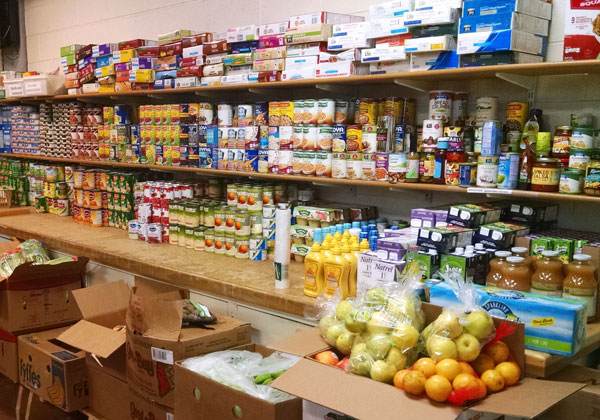Food Pantry Lockhart: A Lifeline for Those Facing Food Insecurity
Food Pantry Lockhart: A Lifeline for Those Facing Food Insecurity
Blog Article
Why Supporting Your Local Food Kitchen Is Essential for Aiding Those in Need
The value of sustaining local food pantries can not be overemphasized, particularly in the context of food insecurity, which impacts a disconcerting variety of individuals and family members within our communities. These vital resources not only give prompt alleviation from appetite yet also add to wider societal benefits, including enhanced health and instructional outcomes. As we check out the complex function of food cupboards, it becomes evident that their impact extends far beyond simply distributing food (Food Pantry Lockhart). Understanding this deeper connection may motivate a reconsideration of how we involve with and sustain these essential establishments.
Comprehending Food Instability
Food instability impacts roughly 10.5% of households in the United States, highlighting a substantial public health and wellness concern that goes beyond mere cravings. It describes the absence of consistent accessibility to sufficient food for an active, healthy life. This problem can cause a variety of unfavorable end results, including bad health and wellness, enhanced healthcare costs, and diminished academic performance amongst youngsters.
The sources of food insecurity are diverse, frequently originating from financial factors such as hardship, joblessness, and underemployment. Geographic place can likewise play a vital duty, with food deserts-- areas with minimal access to cost effective and nourishing food-- aggravating the issue - Food Pantry Lockhart. Additionally, systemic elements, consisting of social and racial injustices, add to the out of proportion impact of food insecurity on marginalized areas
Addressing food instability is not just concerning enhancing food supply; it requires a comprehensive method that includes economic security, education, and area support. Food insecurity not just impacts specific health however likewise has more comprehensive effects for societal health and efficiency. Comprehending its intricacy is necessary for developing efficient treatments and fostering long-term solutions that guarantee all people have reliable access to nourishing food.
The Duty of Food Pantries
Local food pantries act as vital lifelines for people and family members facing food instability. They give necessary food things to those that may struggle to pay for adequate nourishment because of financial challenge, joblessness, or unanticipated situations. By distributing food at no cost, these organizations aid alleviate hunger and avoid the negative health and wellness influences associated with inadequate diet regimens.
Food kitchens commonly partner with neighborhood farms, food store, and area organizations to source a selection of nourishing food products, consisting of fresh fruit and vegetables, dairy, and healthy proteins. This cooperation guarantees that cupboard customers obtain not only food yet also healthier choices that contribute to total wellness.
Moreover, food pantries work as community hubs, cultivating links among residents and giving a sense of dignity to those in need. Many cupboards provide added sources, such as nutrition education and learning and recommendations to social services, aiding clients navigate their challenges a lot more successfully.
Essentially, food cupboards play a complex function in combating food instability. They not only address immediate appetite however additionally encourage people and family members to boost their situations, consequently promoting neighborhood durability and communication.

Benefits of Supporting Food Pantries

Supporting food pantries not only nurtures those in need yet also enhances the material of the neighborhood. By offering vital food resources, food cupboards reduce appetite and lower food insecurity, which is vital for the health and wellness and well-being of families and individuals. Accessibility to nourishing food adds to enhanced physical health and wellness, far better educational outcomes for kids, and enhanced psychological wellness, therefore promoting a much more productive and engaged community.
Moreover, sustaining food cupboards promotes social cohesion. These organizations serve as centers for community engagement, combining volunteers, contributors, and receivers in a common mission to battle cravings. This collaboration can break down obstacles, foster understanding, and construct relationships amongst diverse neighborhood participants.
Furthermore, contributions to food pantries, whether in the type of food, funds, or time, promote the local economy. Numerous food cupboards focus on sourcing from local producers, therefore supporting neighborhood farming and companies. This produces a cycle of support that benefits not only those in need however the area as a whole.
Just How to Get Involved
Interaction with food kitchens can take lots of types, enabling people and groups to make a purposeful impact in their communities. Monetary contributions are likewise indispensable, as they allow food pantries to buy fresh produce and necessary products.
Offering your time is another impactful means to support neighborhood food kitchens (Food Pantry Lockhart). In enhancement, take into consideration organizing food drives within your workplace, school, or area team to increase awareness and gather resources.
Collaborations with neighborhood services click this site can further improve assistance for food pantries. By taking these actions, groups and people can considerably boost the efforts of local food kitchens and assist those in need.
Community Influence and Connection
Identifying the profound influence of food kitchens on community health is important for cultivating a spirit of connection and collaboration. Food kitchens offer not only as vital sources for those facing food insecurity however also as centers for community interaction. They unite diverse groups-- contributors, customers, and volunteers-- producing an environment where individuals can sustain and link each other.
The impact of food pantries prolongs past plain provision of food; they function as a stimulant for social cohesion. By participating in kitchen efforts, community members can establish connections that transcend socioeconomic barriers. This network of support helps to take apart the stigma usually related to food aid, fostering an environment of acceptance and understanding.
As individuals join in their efforts to support regional food pantries, they grow a sense of shared objective and responsibility, reinforcing the idea that everyone has a role to play in ensuring that no one goes hungry. Eventually, click to find out more sustaining food kitchens strengthens the fabric of the neighborhood as a whole.
Conclusion
Supporting regional food kitchens is important in combating food insecurity and improving the well-being of prone populaces. Engagement with food pantries cultivates neighborhood links, promoting social cohesion and equity.

Report this page